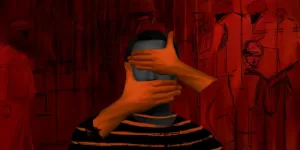Reflections on a Disturbing Year Gone By. And the Challenges That Lie Ahead.
The year ends with a sense of doom. I am not talking about Palestine. It is about our own country, India. The images of a heavily-garlanded Brijbhushan Singh with a victory sign celebrating the win of his proxy in the elections for the post of president of the Wrestling Federation of India juxtaposed with the image of the decorated Olympian wrestler Sakshi Malik crying and hanging up her shoes before the media define the state and mood of India in our times. Malik, along with some other women wrestlers, had levelled charges of sexual harassment and molestation against Singh and had been fighting against him for a long time. Singh, a Bharatiya Janata Party MP, clearly has the full support of his party and of the state. It is a sad reflection on us all that the ruling party thinks there will be no political price to pay if it ignores the cries of these women athletes who have risen from the dusty lanes of villages and done the country proud by winning in international competitions. The country saw a stormy agitation after a woman was raped in Delhi only 11 years back. But there was no mass movement of sympathy or solidarity for these women athletes. Our campuses remained calm even when the images of women wrestlers being dragged away from their protest at Jantar Mantar went viral. It did not cause a ripple in the consciousness of the people at large.
The media treated them with contempt, smelled conspiracy in their charges and agitation, and mocked them. The Delhi police, which had arrested the fact-checker journalist Md Zubair on laughably flimsy charges under POCSO, dragged its feet, and even after concluding that Singh did commit sexual offences, not once but multiple times, decided to let him remain free. There was no media outrage.
In the past few days we also saw the mass suspension of MPs belonging to the opposition parties from both houses. Yet, the news of crucial bills being passed in the near total absence of the opposition does not seem to have disturbed the media and, through them, the wider public. Everything is being done with the force of numbers. Where is the reason for complaint? The opposition MPs are asked to behave and respect the majority. The media is not interested in warning the people of the serious consequences these new laws are going to have on all aspects of their lives.
The media has mildly complained about the breach of parliamentary processes but has got busy with the preparation of the supposedly grand inauguration of the Ram Temple at Ayodhya, discussing the list of invitees and who is being honoured with the invitation and who has been left out. It is as if your reputation depends on your place in the invitee list. We have heard about some prominent opposition members being invited. But we do not expect them to reject the invite by pointing to the criminal way in which the Babri Masjid was demolished, paving the way for the ‘legal’ usurpation of its land for the temple, and why it is unholy to build a temple at the site of what the Supreme court called an ‘egregious crime’ committed on December 6, 1992.
By upholding the abrogation of Article 370 and refusing to rule on the legality of turning the state of Jammu and Kashmir into two Union territories, the Supreme Court has once again shown its willingness to legally legitimize acts of majoritarianism. It has, by doing this, pursued its logic of ‘what is done is done’ and ‘what the government wills, will happen.’ This is in keeping with its 2019 Babri Mosque judgment – giving land to those who were involved in the crime of the demolition of the Babri Mosque – and its 2023 Gyanvapi mosque ruling allowing for an ‘archaeological survey’, thus paving the way for changing the character of the mosque and making the 1991 Places of Worship Act redundant. The constitutional scheme, designed to keep the nation together, is being systematically dismantled, and the apex court is facilitating it, even as the chief justice of India keeps giving weekend speeches waxing eloquent about great constitutional and humanist principles.
The hypocrisy of the judiciary led by the incumbent CJI, like his predecessors, is breathtaking. While speaking for individual liberty endlessly, the CJI, as master of the roster, has ensured that the bail petitions of people arrested (clearly because of their politics) end up before judges known for their aversion to the primacy of liberty.
With the judiciary refusing to perform its role as constitutional watchdog, it seems impossible to stop the Bharatiya Janata Party from reconfiguring the constitutional frame. The party has numbers and is getting no pushback from the elites of India. The corporate world adopted Narendra Modi as its man way back in 2007 – in return for which he has allowed the, to capture all the national and natural resources they want.
By endless violence and hateful propaganda, society has been torn apart so badly that the Indian nation as a shared zone of sensibilities is coming under severe strain. One can see this starkly in Manipur. Meitei majoritarian violence with state patronage has wrecked the state and divided it into two parts which now cannot sit face to face. Kukis have lost all hope of returning to the valley, and Meiteis cannot go to the hills. Kukis have managed to safeguard themselves as they have hills to fortify themselves in and also resources to respond to the violence they have faced. But in the rest of India, other minorities do not have this ‘advantage’ to save themselves from violence.
Today, it is clear that minorities or any socially vulnerable section of the population cannot expect protection from the state apparatus, including the judiciary. Civil society has been effectively disabled. The media has done its best to convince the people that members of civil society are their enemies.
2023 ebbs with Umar Khalid, Sharjeel Imam, Khalid Saifi and Gulfisha Fatima completing three years in Delhi’s jails and Shoma Sen, Mahesh Raut, Hany Babu, and others completing five years in the jails of Maharashtra. They are forgotten people who fought for lost causes. Thanks to the media’s indifference to their plight, the people of India do not relate to them.
It seems there is nothing left now to analyse and our job is merely to record and describe the demolition of the Indian dream. But this is luxury people in India cannot afford. Sitting in Delhi on a gloomy winter day I feel helpless. But then I get calls from a farmer friend in a village in Uttar Pradesh. He is a Muslim. From a state which is most oppressive for those who seek to practise democracy. For Muslims even more so. Here is an Indian citizen who believes that 2024 is still open. We can still turn the tide and recover our democracy. He has a plan and also friends and he wants political parties to listen to him. Or my friends from a youth group in Pune who have been training workers of different political parties and reminding them that the fight is for larger ideas, not only for the gains that power brings. And they feel encouraged that party workers listen. And then our friend Alok Shukla from Chhattisgarh informs us that the adivasis of Hasdeo Aranya are still fighting against mining and their dispossession, even after knowing that the state has a more brutal government in power now. The parents and partners of those in prison still keep reminding the courts of their duty. I see the images of calm Muslim women carrying Palestinian flags which are snatched by the policemen and torn. She looks at him disapprovingly but keeps walking.
As I sign off, my doorbell rings. Here is my young journalist friend from Punjab. He is on way to Chandigarh after spending the week with the wrestlers Sakshi Malik, Bajrang Punia and others. He is upbeat. “Don’t you think it is a victory that these wrestlers who could not think beyond awards only a year back now stand upright before a mighty state knowing well what they are up against?”, he asks. I cannot but agree. The fight is still left in us. It is not over.
(Apoorvanand teaches at Delhi University. Courtesy: The Wire.)




